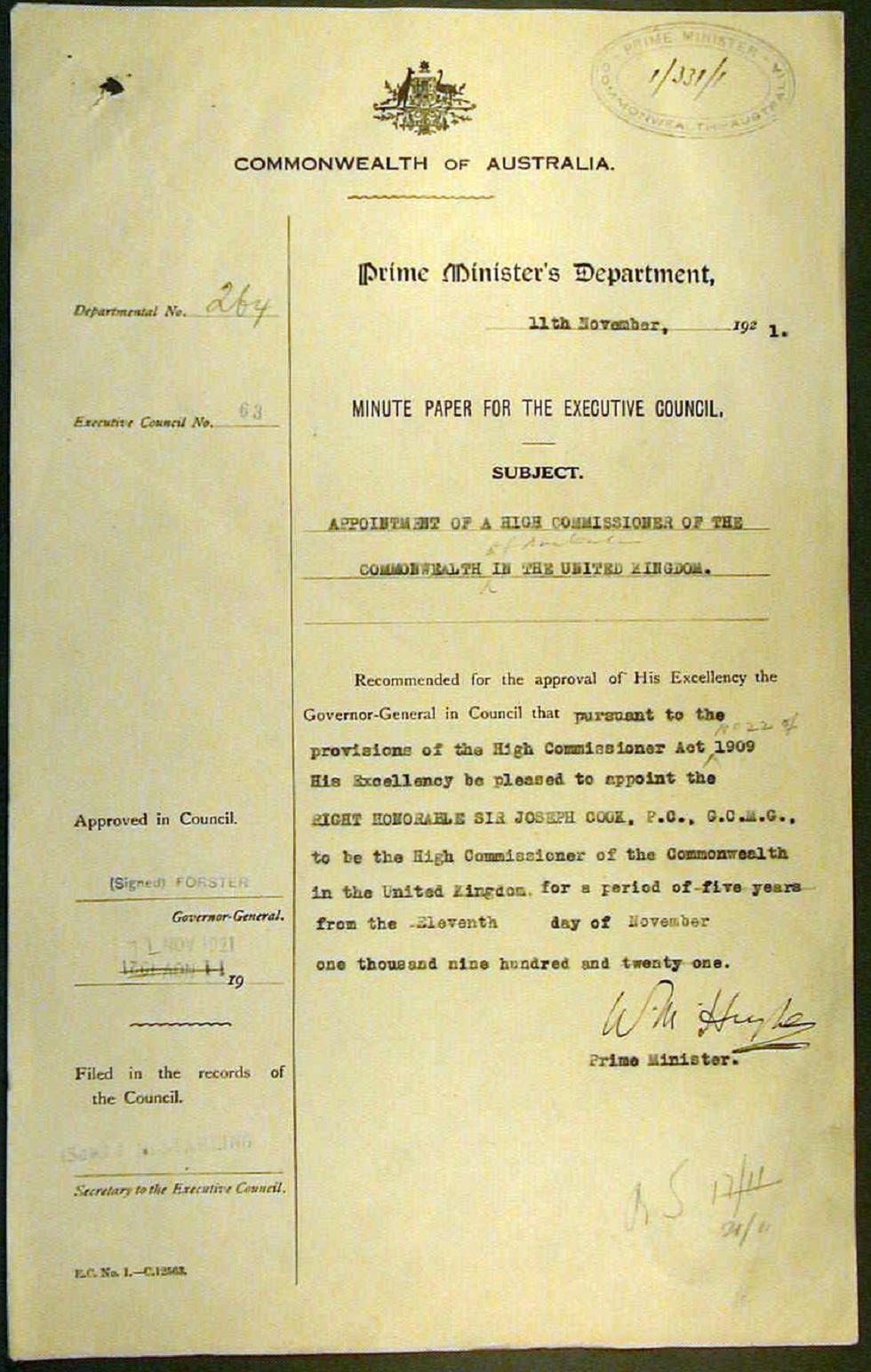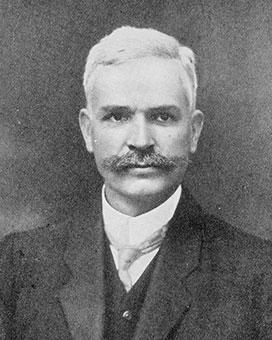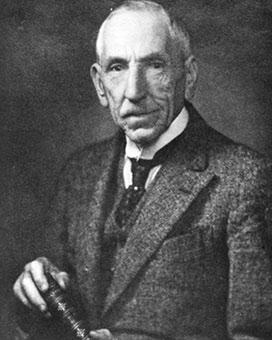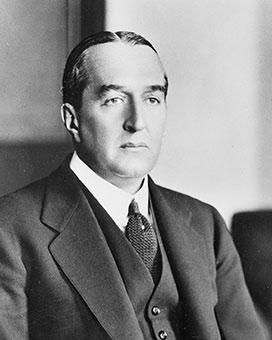After losing office in 1914, Joseph Cook was Leader of the Opposition for three years, until Prime Minister WM Hughes’ defection from the Labor Party reshaped the parliament.
Cook served in Hughes’ Nationalist government as Navy Minister from 1917 to 1920, and as Treasurer from 1920 to 1921. Hughes and Cook were Australia’s delegates at the Treaty of Versailles in 1919.
Cook resigned from parliament in 1921 to become Australia’s High Commissioner in London and was an Australian delegate to the League of Nations in the 1920s. He returned to Australia in 1927 and lived in Sydney for 20 years. Joseph Cook died on 30 July 1947.
Leader of the Opposition
The Opposition benches were frustrating for Joseph Cook, once Andrew Fisher took over leadership of Australia’s role in the war. The same day Labor took office, an Australian expedition forced Germany to surrender New Guinea to the Australian expeditionary force. It was Fisher who first received the news that Australia’s Navy had passed its first test in action, when HMAS Sydney sank the German cruiser SMS Emden off the Cocos Islands on 9 November 1914.
The Fisher government survived only for 1 year – William Hughes replaced Fisher on 27 October 1915. Cook promised his support of Hughes ‘without reserve’ to implement conscription.
Navy Minister 1917–20
When the first conscription referendum was lost in October 1916, the Labor Party split. William Hughes led 24 of the Labor parliamentarians out of the party. To ensure his new Nationalist group retained sufficient majority to govern, the expelled Labor leader began negotiations with Cook, also a former member of the Labor Party. Early in February 1917 they had confirmed the new arrangements for a Nationalist government. Hughes remained Prime Minister and Cook became deputy leader and Minister for the Navy.
Joseph Cook was sworn in on 17 February. The Cabinet comprised 5 former Labor members and 6 former Liberals. Cook’s influence in his portfolio was compromised by Hughes’ leadership style – both the Prime Minister and his very experienced Defence Minister, George Pearce, often dealt with major naval issues directly.
In April 1918, Joseph and Mary Cook accompanied the Prime Minister and Mary Hughes to London for the Imperial War Conference. In September, both men were among the pallbearers at the funeral of George Reid in London. They visited the battlefields in France and, when Germany surrendered on 11 November, they remained based in London to take part in the negotiations for the terms of peace. Both Hughes and Cook argued for stringent reparations to punish German aggression and deter rearmament.
While in England, Cook was knighted, and he and Mary Cook visited Silverdale in Staffordshire, where they received a warm welcome in Cook’s old home town.
At Versailles
William Hughes and Joseph Cook were Australia’s delegates to the Peace Conference in Versailles, France from January to June 1919. Robert Garran was principal adviser to Hughes, and John Latham was Cook’s adviser. In effect, Hughes was the major figure, but their views of Australia’s interests were largely shared. Hughes was a proponent of punishment and Cook wrote in his diary that Germany had ‘No right ever to be considered as a civilised nation until she has purged herself’.
The Peace Treaty, signed in the Palace of Versailles’ Hall of Mirrors on 28 June 1919, bears the signatures of Hughes and Cook among those of the delegates from the 42 participating powers. The Treaty established the League of Nations, and Cook remained a strong supporter. He served as Britain’s chief delegate on the commission defining Czechoslovakia’s postwar borders, and strongly supported the inclusion of Sudetenland.
The League of Nations mandated to Australia two territories captured by Australian forces in 1914, German New Guinea and the island of Nauru, located 4000km north-east of Sydney.
Treasurer 1920–21
Cook and Hughes returned in triumph to Australia in August 1919. At the federal election in December, the Nationalist government retained a majority in both Houses of parliament.
Cook remained Navy Minister until July 1920, when he took the Treasury portfolio. The Treasurer, William Watt, had resigned over Hughes’ failure to delegate responsibility to him on a vital mission to London. In 1921, Hughes was again on an extended visit to England, and Cook was acting Prime Minister from April to September 1921.
Joseph Cook retired from parliament in November 1921 to succeed Andrew Fisher as Australia’s High Commissioner in London.
High Commissioner 1921–27
Joseph Cook served as High Commissioner from 11 November 1921 until 10 May 1927, during the governments of William Hughes and Stanley Bruce. His brief was the postwar promotion of British immigration and capital investment, to promote Australian produce and encourage trade, and to encourage imperial defence cooperation. Developing preferential trade relations within the British empire and reciprocal tariff arrangements with other countries was a key program of the Bruce government.

The federal Executive Council resolution that the Governor-General appoint Sir Joseph Cook Australia's High Commissioner in London. NAA: CP268/3, COOK J, p. 87
As High Commissioner, Cook was also a key figure in the implementation of the Empire Settlement Act 1922, the British immigration agreement of 1925, the Development and Migration Commission in 1926, and the launch of the ‘Big Brother’ child migration scheme.
Cook attended the Genoa Economic Conference in 1922 and assisted Stanley Bruce at the Imperial conferences in London in 1923 and 1927. He was an Australian delegate to the General Assembly of the League of Nations each year from 1922 to 1926. When questioned in the Assembly on issues relating to Australia’s obligations on its mandated territories, Cook ‘wrathfully defended the administration of his Government’.
Retirement
From June 1928 to March 1929, Cook chaired a federal Royal Commission established to examine South Australia’s case for Commonwealth aid. The claim arose over arguments that Commonwealth legislation had caused a State budgetary deficit. The Cook Report recommendation that South Australia be given recompense over three years was implemented.
In retirement, Sir Joseph and Dame Mary Cook lived for 20 years at the Bellevue Hill home they bought on their return to Australia in 1927. Cook died there on 30 July 1947, and at his state funeral, William Hughes was one of the pallbearers.
Sources
- La Nauze, JA, Alfred Deakin: A Biography, Vol. 2, Melbourne University Press, Melbourne, 1965.
- Murdoch, John, Sir Joe: A Political Biography of Sir Joseph Cook, Minerva Press, Sydney, 1996.
- Thomson, John, The Australian High Commission in London, Its Origins and Early History, PhD thesis, Australian National University, 1980.





